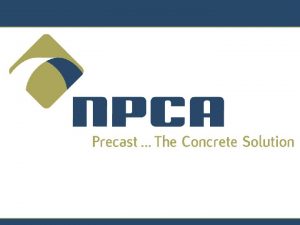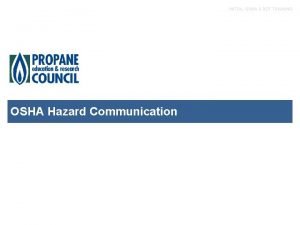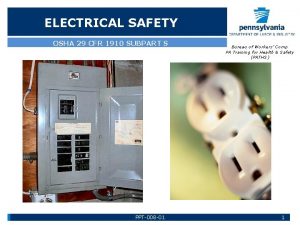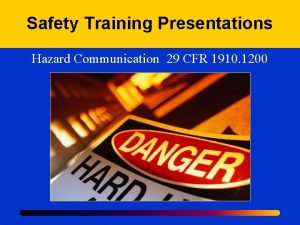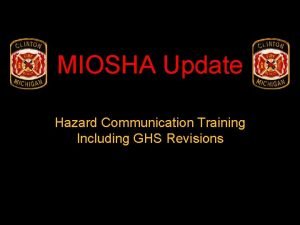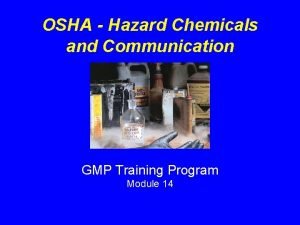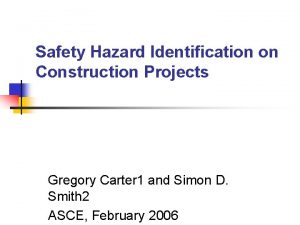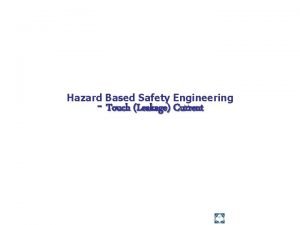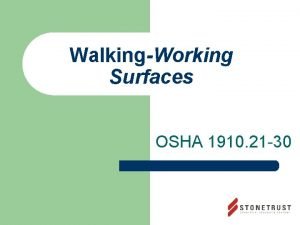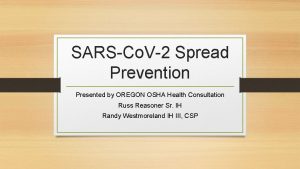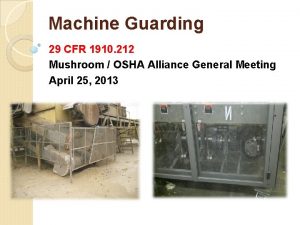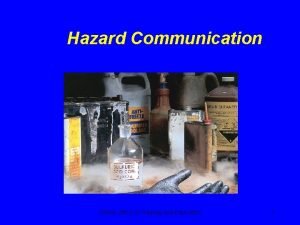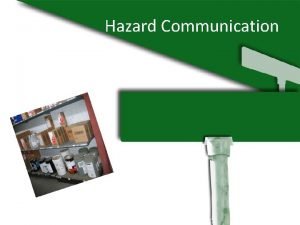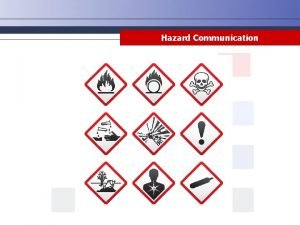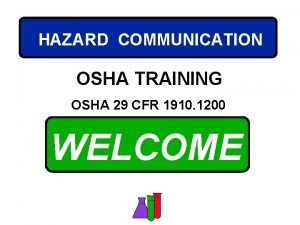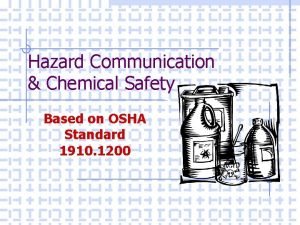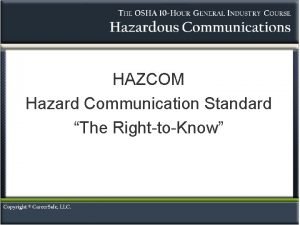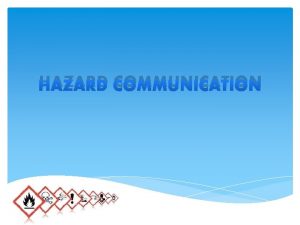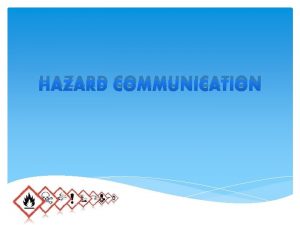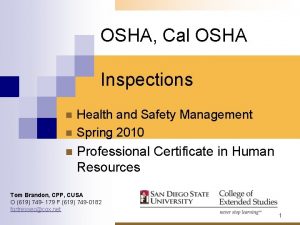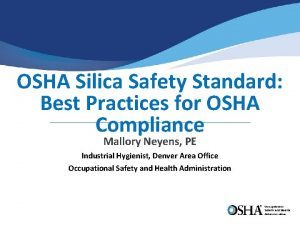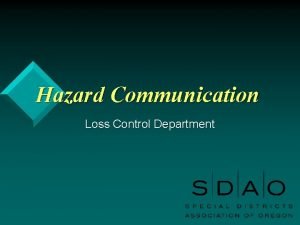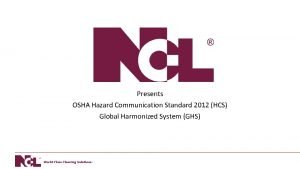UPDATES TO THE OSHA HAZARD COMMUNICATION STANDARD Safety















- Slides: 15

UPDATES TO THE OSHA HAZARD COMMUNICATION STANDARD Safety Data Sheets (SDS), Labels, & Pictograms

BACKGROUND v OSHA’s Hazard Communication Standard (29 CFR 1910. 1200) was re-issued in 2012 to bring it into alignment with the United Nation’s Globally Harmonized System of Classification and Labeling of Chemicals (GHS) v The revisions include more structured requirements for labeling and formatting Safety Data Sheets (SDS, previously called MSDS) v The updated labels and SDSs more quickly and clearly convey hazard information so that the users are informed about how to protect themselves.

SAFETY DATA SHEETS New format requires 16 -sections v Sections 1 -8 contain general information about the chemical’s identity, hazards, safe handling, and emergency control measures. v Sections 9 -11, and 16 contain technical and specific scientific information including physical and chemical properties, exposure control and toxicological information, and stability and reactivity guidance. v Sections 12 -15 contain information regulated by DOT, EPA and other agencies as well as the date of preparation or last revision of the SDS.

SDS—KNOW THE SECTIONS v Section 1 -Identification v Section 2 -Hazards v Section 3 -Ingredients and Composition v Section 4 -First Aid Measures v Section 5 -Fire Fighting Measures v Section 6 -Accidental Release Measures v Section 7 -Handling and Storage v Section 8 -Exposure Controls/PPE v Section 9 -Physical & Chemical Properties v Section 10 -Stability & Reactivity v Section 11 -Toxicological Information v Section 12 -Ecological Information v Section 13 -Disposal Considerations v Section 14 -Transport Information v Section 15 -Regulatory Information v Section 16 -Other, including SDS date

LABELS New Manufacturer Labels must include the following: v Product Identifier v Signal Word v Pictogram v Hazard Statements v Precautionary Statements v Name, address, & phone number of chemical manufacturer, distributor or importer

PRODUCT IDENTIFIER Can be name, code number, batch number or whatever manufacturer chooses. The same identifier will appear on the label and the SDS

SIGNAL WORD Only one of two choices will be used: WARNING or DANGER Used to alert relative severity of hazard DANGER indicates a greater hazard than WARNING

PICTOGRAMS Requirements: -Red square set on a point -Black hazard symbol -White background. OSHA has designated 9 different pictograms in the Haz Com standard to indicate hazard category.

OSHA PICTOGRAMS Hazards at a Glance

HAZARD STATEMENTS Describe the nature of the hazard and degree of the hazard. Specific to the hazard classification. Always the same for the same hazard, regardless of the chemical.

PRECAUTIONARY STATEMENTS Describe recommended measures to minimize or prevent adverse effects resulting from exposure, improper storage, or improper handling of a chemical. There are 4 types: v Prevention v Response v Storage v Disposal They can be combined for readability and to conserve space or, when similar, the most stringent statement utilized on the label.

PRECAUTIONARY STATEMENTS Combined and formatted to conserve space

NAME, ADDRESS, AND TELEPHONE NUMBER Chemical Manufacture r, importer, or other responsible party

SDS AND LABELS v Information must be in English, but can also be in other languages v Precautionary statements on the label and SDS will be the same v Labels can include additional supplemental information v Information on the label can be used to ensure proper storage and provide immediate guidance for emergency response personnel. The Hazard Communication Standard STILL requires that SDSs be readily accessible for all hazardous chemicals in the workplace.

QUESTIONS? If you have any questions regarding this training, the updated Hazard Communication Standard or need additional information on SDSs or labels, contact the Environmental Health Coordinator. Marcella Mullenax mullenmr@jmu. edu Please proceed to the quiz for the updated Hazard Communication Standard. A minimum score of 80% must be achieved for successful completion of the training.
 29 cfr1910.1200
29 cfr1910.1200 29 cfr 1910 hazcom
29 cfr 1910 hazcom Osha hazard communication inital training
Osha hazard communication inital training Osha subpart s
Osha subpart s 29 cfr 1910 osha 178
29 cfr 1910 osha 178 Miosha hazard communication standard
Miosha hazard communication standard Osha hazard and ghs training regulation cfr 1910
Osha hazard and ghs training regulation cfr 1910 Safety hazard identification on construction projects
Safety hazard identification on construction projects Hazard based safety engineering
Hazard based safety engineering Osha hot work standard 1910
Osha hot work standard 1910 Osha housekeeping standard 1910
Osha housekeeping standard 1910 Oregon osha bloodborne pathogens
Oregon osha bloodborne pathogens Osha conveyor safety 1910
Osha conveyor safety 1910 Osha cfr 1910 is the standard for______.
Osha cfr 1910 is the standard for______. Osha power tools must be fitted with guards and
Osha power tools must be fitted with guards and Osha hand tools 1910
Osha hand tools 1910

